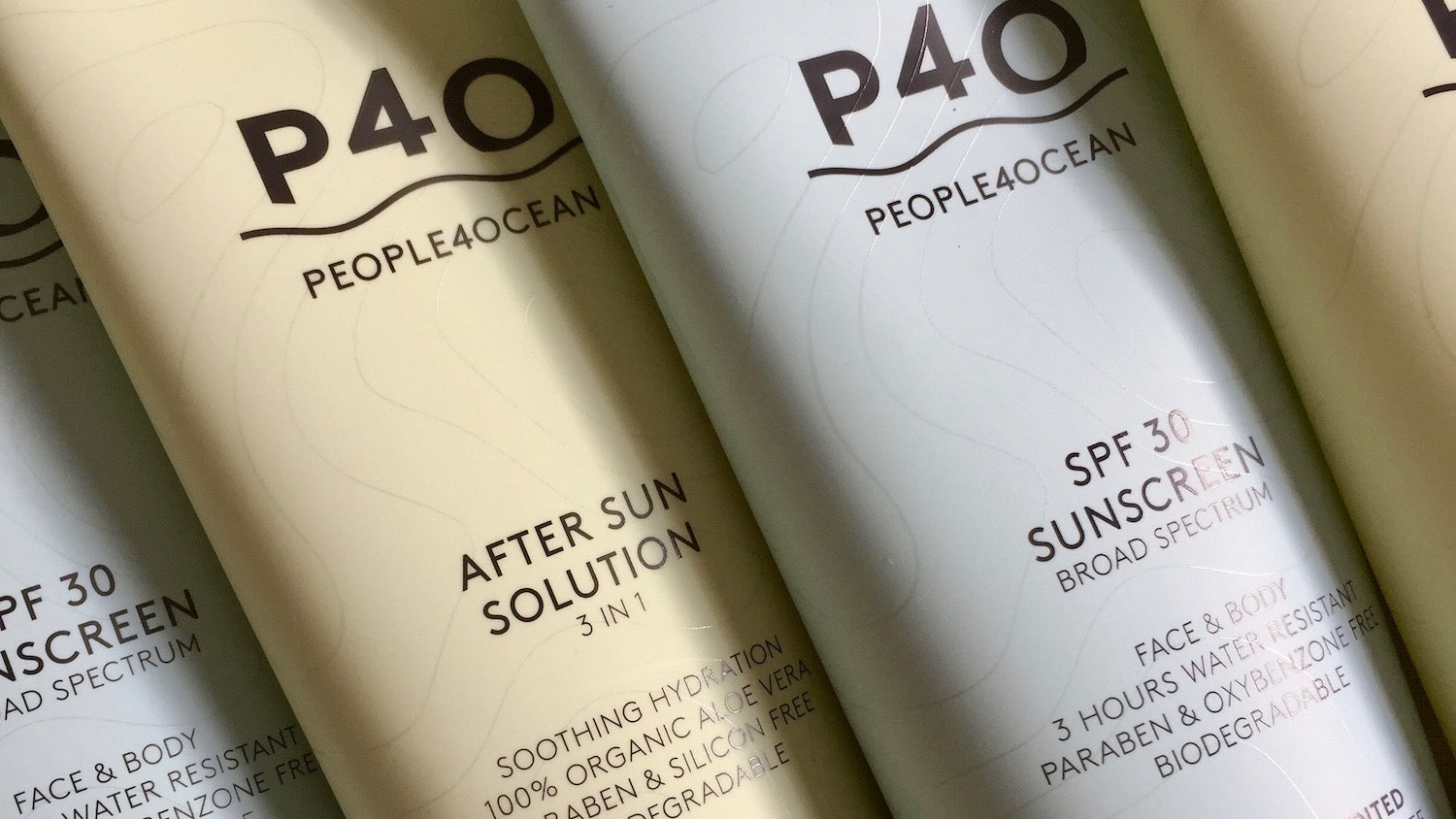
With our oceans filling up with plastics, and climate change virtually threatening all ecosystems and species on Earth, choosing the best packaging solution was not a decision we made lightly at People4Ocean. After thorough research and weighing the pros and cons of each packaging solutions available at large scale we opted for the Aus made solution you see today on our store.
Our sunscreen tubes are made from a special type of plastic, derived from the sugar cane plant instead of conventional plastic which is normally derived from petroleum sources (fossil fuels). Our tubes are also 100% Aus mad and manufactured using solar power and are kerbside recyclable. Here are the main factors that determined People4Ocean packaging solutions:
-
Aus made
Australian sourced packaging is definitely a must for our team. We are proud to offer our products in tubes that are 100% Australian-made. This allows us to contribute to our local economy, supporting employment in Australia as well as ensuring high ethical and environmental manufacturing standards, which are not always matched in other manufacturing countries like China. Alternative packagings - such as aluminium jars or tubes - can only be sourced overseas (therefore impacting on our ethical and environmental benchmarks). Having our tubes manufactured in Australia also significantly reduces our carbon foot print by not importing empty tubes (containing air). According to a report published by the Guardian (UK) “just one of the world’s largest container ships can emit about as much pollution as 50 million cars.
-
Formulating 100% Natural
Because they are chemical-free (such as synthetic mixers and emulsifiers), our creams require regular mixing (hence the “shake and knead tube before use” directions) to allow for the micronised zinc oxide particles to mix with the essential oils, keeping the formula well blended. For this reason, our packaging needs to be soft and malleable to avoid separation and solidification of the cream, which can occur in solid packaging.

-
Fighting climate change
Our Aus made tubes contain sugar cane polyethylene (PE). Since sugar cane is a plant, it captures carbon whilst it is growing, making it a low-carbon alternative when compared to conventional plastics derived from petroleum. What’s more, our Australian tube manufacturer is powered by a solar farm - which further reduces the carbon footprint of our tubes. They have also taken on a forest regeneration project near Canberra to further sequester carbon dioxide from the atmosphere and provide natural habitat to endemic flora and fauna.
These commitments strongly align with our determination to combat climate change. The manufacturing of aluminium (a material we have considered) requires intensive mining and is extremely energy-intensive (emitting up to 4 times more CO2 than conventional plastics manufacturing). Aluminium jars are mostly sourced in China, where manufacturing is mostly powered by coal, the largest source of carbon dioxide emissions, hence heavily contributing to climate change.
-
Customer convenience
Our mission is to offer the best reef & skin-safe sun protection alternatives, to encourage as many people to make the switch, and to end sunscreen pollution in our oceans and within our bodies. Tubes remain the most convenient way to apply and transport sunscreen (to and from the beach) for most users. It is also the only type of packaging that allows bulk sizing (200 mL+), hence cutting down on packaging. Other plastic-free alternatives also have their drawbacks:
- Aluminium jars: The largest available size for aluminium jars is 100 mL, hence increasing the use of packaging. Despite being reusable and recyclable, aluminium jars also have significant environmental drawbacks when it comes to sourcing and manufacturing.
- Glass jars: Glass packaging is highly reusable and recyclable. It is widely used in the cosmetic industry, for creams and makeup which are meant for your bathroom shelf. It is not however a convenient packaging for sunscreen, which most of us carry around for outdoors activities. Packaging sunscreen in glass would carry the risk of breakage, a potential hazard on beaches, near swimming pools and other places where people are walking barefoot. It is also one of the heaviest packaging solutions, significantly increasing transport emissions.

-
Recyclability in Australia
The Australian government has set four national packaging waste targets, with the goal of achieving these targets by 2025. The four targets are:
- 100% of all Australia’s packaging will be reusable, recyclable or compostable by 2025 or earlier
- 70% of Australia’s plastic packaging will be recycled or composted by 2025
- 30% average recycled content will be included across all packaging by 2025
- Problematic and unnecessary single-use plastic packaging will be phased out through design, innovation or introduction of alternatives
By choosing our Aus made tubes, we can meet all four of the Australian government 2025 packaging targets today.
All our tubes are kerb-side recyclable, but if you want to guarantee its recyclability, you can now return your empty tubes to us and we will arrange for it to be recycled by our tube manufacturer.


Comments (0)
Back to Blog